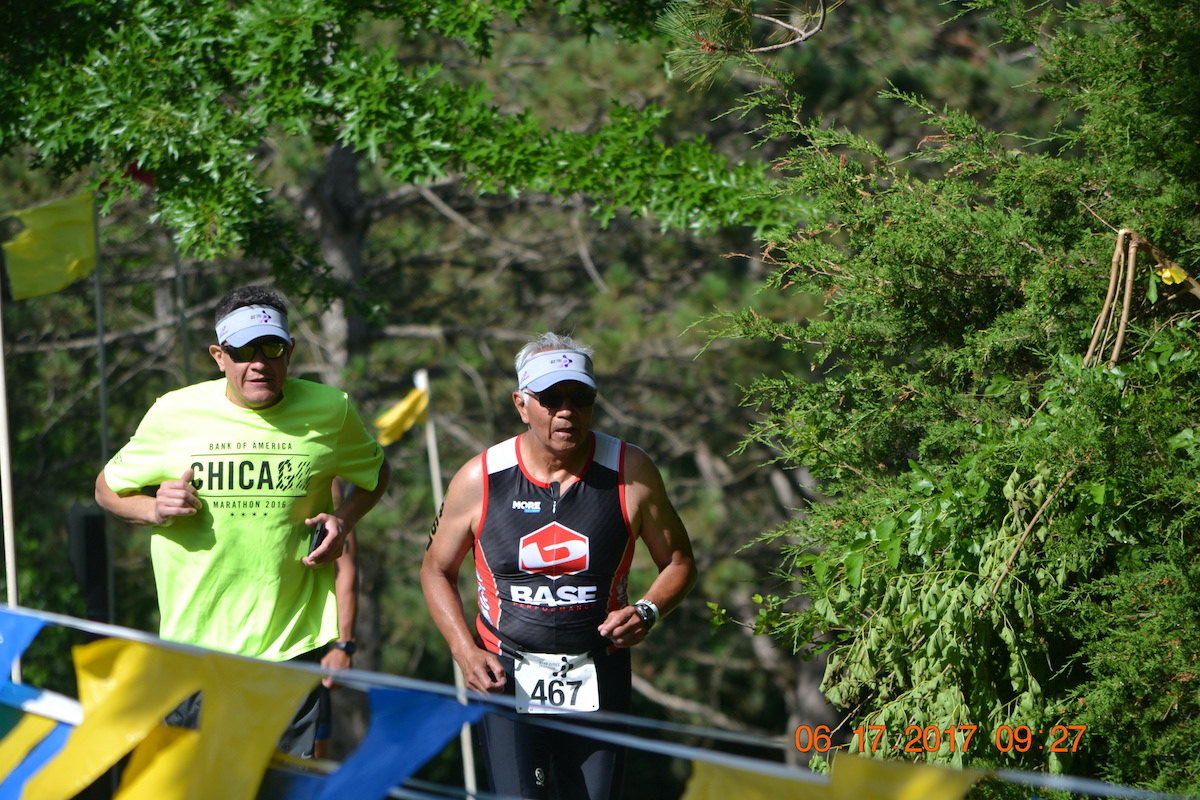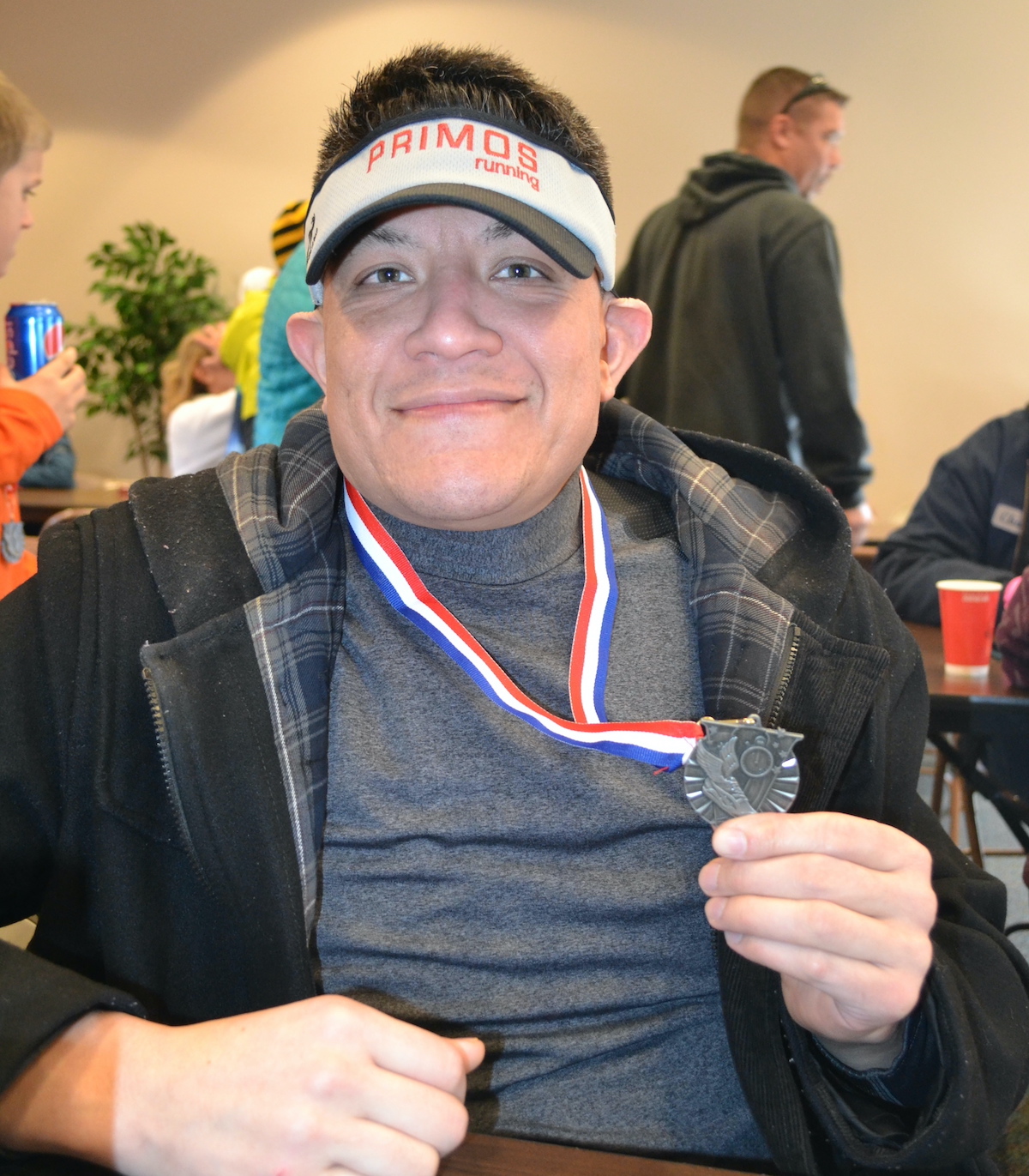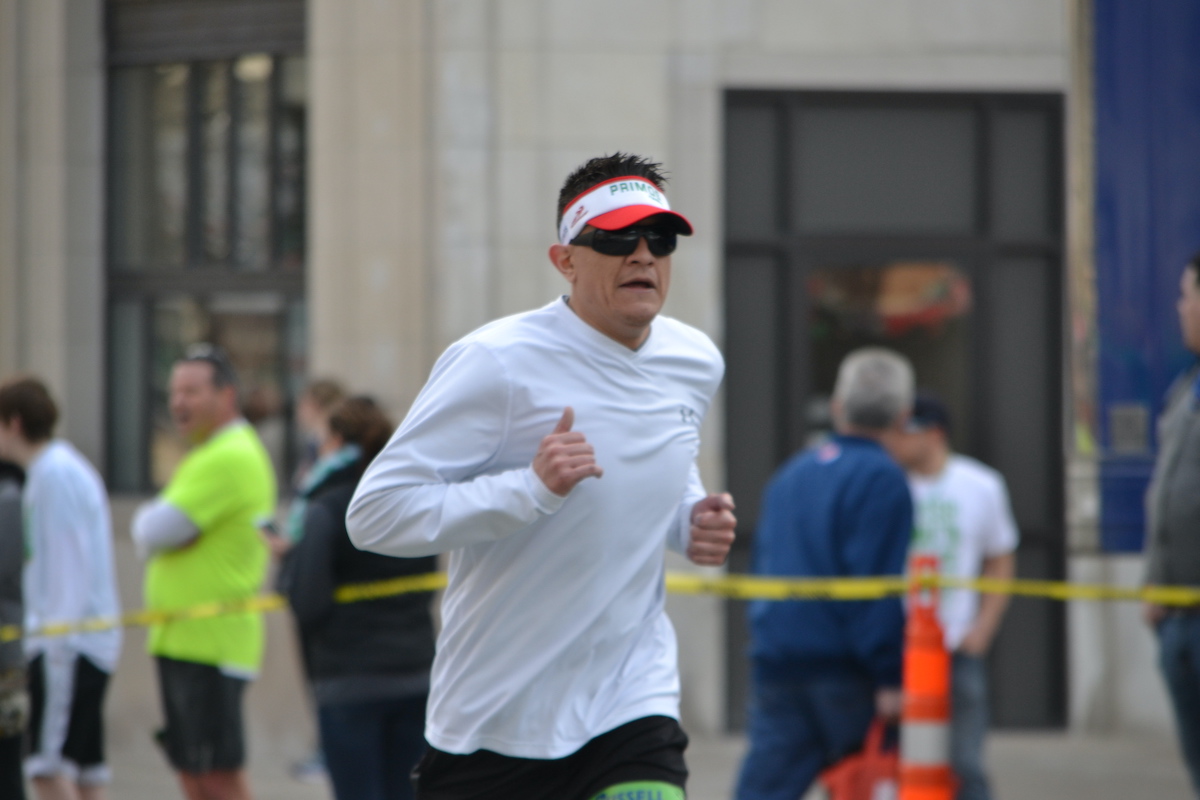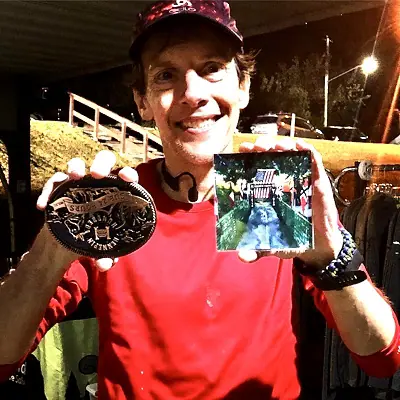[Editor’s Note: This article is authored by Henry Howard. Henry is a runner, coach, and founder of the Run Spirited website, which shares great storytelling from a wide variety of running disciplines.]
Kathy Rivera wasn’t sure her son, Anthony Rivera, would survive his brain aneurysm and the subsequent fall down four concrete steps it caused. As he fell, he hit the opposite side of his head from where the aneurysm occurred, additionally suffering a traumatic brain injury.
Upon arrival to the hospital in Iowa City, Iowa, an hour from their home in Davenport, his condition was so critical that doctors performed surgery to stop the bleeding as family members arrived. When the surgeons emerged, they sought family approval for a second surgery to remove a bone flap.
“The doctors wanted to release a second bone flap to reduce the swelling,” says Kathy, adding the surgery had a 50/50 chance of success. “He could have died in surgery. But he definitely would have died if we hadn’t removed that flap.”
Kathy stayed with him overnight for weeks, hoping, praying, and wondering.

Anthony Rivera (left) and his father, Ronald, prior to his accident competing in a local triathlon. All photos courtesy of Matthew Rivera.
Coming Home
The Rivera family has always bonded around running events. Together, they oversee the mile 88 aid station at the Hennepin Hundred Mile, which takes place each October in Sterling, Illinois.
Kathy plays the role of crew chief, organizer, and cheerleader. Ronald, her husband, inspired the family to follow his passion for running. Almost all their children, including Matthew, Anthony, Ryan, and Manuel, are runners. While their sister, Olivia, doesn’t run, she volunteers at the aid station regularly. She was also an instrumental part of Anthony’s recovery.
Following Anthony’s accident in June 2019, the thoughts of his parents and siblings were far from packet pickups, aid stations, or finish lines. His close family surrounded him with love, compassion, and support as he faced a dire prognosis. Anthony, who was 41 years old when he fell, made minimal gains at a long-term care facility after a year. His weight dropped from 185 to 114 pounds.
“When COVID-19 hit, it restricted us from visiting him in long-term care, maintaining an eye on him, and making sure he was being cared for properly,” Matthew explains. “Two months into the pandemic, we hadn’t seen him. We didn’t know really what was going on.”
Frustrated with her son’s lack of progress and visitation restrictions, Kathy sought and received permission to bring him home and provide his care. It was an unusual move. Even though medical professionals balked, they eventually agreed. The family and Anthony’s friend rallied and worked together.
“At that time, he was not functional,” Matthew says. “He was like a two-year-old, essentially. We were feeding him through tubes. We were changing his diaper and his bed every couple of hours. They expected us to return him, but we didn’t. We kept taking care of him, rotating to provide help.”
It was just the medicine Anthony needed.
“Eventually, we started to see a lot of improvement from him,” Matthew says. “It was like someone turned on a switch and he was responding more. He wasn’t as stressed out. We really think it came down to the love and care that we were providing for him versus him being in a long-term care facility.”
Getting Stronger
In the 18 months since his family has started to care for him, Anthony has made huge strides: he now feeds himself, bathes himself, and no longer needs a wheelchair. He takes some medication through a feeding tube and is able to swallow other pills.
He lost some functionality in his right arm, so he requires assistance with some activities like putting on socks and shoes. He communicates mostly through text messages.
“He can write his name, address, phone number, and things like that,” Kathy says. “But actual total speech may not come back. And his arm may never come down either. Where he is at might be where he is going to be for the rest of his life. Or maybe a light switch will turn on and things will change. The prognosis is usually about five years for knowing whether a patient is going to continue to improve or stay where they’re at.”
Anthony is working with speech and physical therapists, with the goal of returning to work.
“He did a resume on the computer,” Kathy says. “He really wants to go back to work, but we tell him he has to go to his physical therapy for walking and working with his hand and speech before he can get a job. This year has been a lot of improvements for him,” she adds proudly.
“Before, he could hardly walk. The therapist came and helped him so he would walk down my hallway. Now he walks up and down the stairs. And he wants to run.”
The Family That Volunteers Together, Stays Together
Anthony stays active, riding a stationary bike, stretching, and run-walking. So far he has finished three races: a one mile, two mile, and a 5k.
The Firecracker One Mile, which takes place in East Moline, Illinois, was his first race after the accident.
“It was a pretty nice day,” Kathy recalls. “Most of the participants who ran were either family members or health care workers and actual patients like Tony who completed the race. We were all very proud that he did it. He finished it on his own, walked it all by himself.”
Even though he finished last, it was a memorable moment.
Anthony received a police escort with sirens and flashing lights. And when he crossed the finish line, volunteers held out the finish line banner to let him run through like he won the race.
“That made him so excited,” Kathy says. “He was telling everybody the best he could, grunting and groaning, but I knew he was totally excited. That was a really big milestone for him, just to prove to himself that he could do it.”
In a text message, Anthony shared how running again makes him feel. “It makes me happy to be able to walk/run. I’m out of shape and my legs and arms hurt during and after I run.”
Not only has Anthony participated in races as a runner, but he also returned last month to help his family at the Hennepin Hundred aid station. His brother Ryan began the tradition when he volunteered for the race five years ago, and brought the whole family along — even though none of the Riveras had run an ultramarathon at that point.
“They were looking for captains for the aid stations and he thought it’d be something we’d like to do,” Matthew says. “Ryan thought the family could get out there and help these other runners. Then we fell in love with the idea of helping these people at that point in the race, since it’s so deep in. You just see them coming through and you feel their pain, but you know you’re there to try to make it a little bit easier for them to continue.”
In 2018, Matthew attempted the 100-miler even though his longest race to date was a marathon. He DNFed at mile 88, the family’s aid station.
“We literally had to carry him to the car,” his mother recalls.
That same year, Anthony finished his first ultra, the 50k distance at the same Hennepin race weekend.
“When Matt dropped out, he told Tony to keep on going,” Kathy says. “So Anthony kept going and we went to meet Anthony at the end. He still had quite a bit of energy left. I was surprised for that being his longest run too, the first time ever doing that distance. We were very proud that he did that.”

Anthony holding up a medal from the Run Your Ice Off race in Kewanee, Illinois, which he raced after his injury.
Part of the Crew Again
Anthony is reading a running book his brothers gave him. It’s exciting for Kathy to see the passion he still has for the sport.
“He’s excited about it,” she says. “I’m happy that he’s wanting to do these things and get up and move. Some days, it’s a struggle for him. And other days, he’s rip-roaring ready to go. The boys tell him, ‘Get up strong and work your arms and work your legs.’ They’re very good motivators for him.”
At Hennepin, he was motivated by the ultrarunners at the aid station. Initially, Anthony didn’t want to go, but once he got there around 6:00 p.m., it was hard to get him to leave. At first, he just watched the activities. But then he jumped in to help.
Anthony pointed to food items for the runners, poured drinks for them, and retrieved ice. Kathy figured he’d want to leave when it got dark around 7:00 p.m. An hour later, they asked if he wanted to leave. Anthony held up two fingers, signaling two more hours.
“I ran the 50k and know how important the aid station is at that point in the race,” Anthony wrote in a text. “It makes me proud to help fellow ultrarunners. I feel like I’m part of the crew again!”
At 10:00 p.m., he indicated he was good for three more hours.
“He wanted to stay until four or five [in the morning], but his friend [Dawn Quinones] had to go to work,” Kathy says. “He finally gave in to her and it started to feel cold to him. The weather does affect him. His body does not adjust to heat and cold as fast as we would. Sometimes he gets really cold real fast, and then other times he’s sweating within the same half-hour or hour. His body temperature just fluctuates and we just dress accordingly.”
Matthew served as captain of the aid station this year.
“It meant a lot to me to have Anthony there, because I know he wanted to run the 50-miler in 2019 and unfortunately had his accident,” he says. “I think we all are so encouraged by the dedication and pure grit that an ultrarunner has when they come through our aid station. Just inspires us to, I guess, help them and continue on our path. So I think when he was there, it gave him a little bit of grit.”
Anthony still demonstrates the traits of an ultrarunner. He shows signs of being stubborn, expresses kindness, and drinks coffee, sometimes at 2:00 or 3:00 a.m.
“When his nieces and nephews come over, he fist bumps and hugs them,” his mother says. “At first, they were leery of him because of the sound he makes, but now they come in, say hi and give him a fist bump and a hug. He’s kind and loving.”
A Bounty of Gratitude
In the Quad Cities area [on the border of Illinois and Iowa], there are 500 or more members of the close-knit Riveras. While they weren’t all together for Thanksgiving, the Riveras had around 40 to 50 for the first large family gathering since Anthony’s accident. And there was no shortage of gratitude.
“We’re very thankful for all of his progress,” Matthew says. “It’s pretty incredible how a doctor tells you not to expect much and we saw how he was in the long-term care. But after bringing him home, the acceleration of physical and mental improvements were just astonishing. We’re very thankful for how far he has come and how far he’ll continue to go.”
Anthony knows and appreciates his family and friends for their role in his recovery.
“I’m thankful that the good Lord has given me a second chance,” he texts. “I’m thankful for my family, my mom, dad, siblings, and friend Dawn for being with me during my recovery. I’m thankful for all my primos [cousins] who support and encourage me to keep pushing.”
Call for Comments
- Do you know Anthony Rivera, the Rivera family, and their aid station at the Hennepin Hundred?
- Do you know anyone in the running community who has gone through an accident or illness and is still able to be part of the community?

